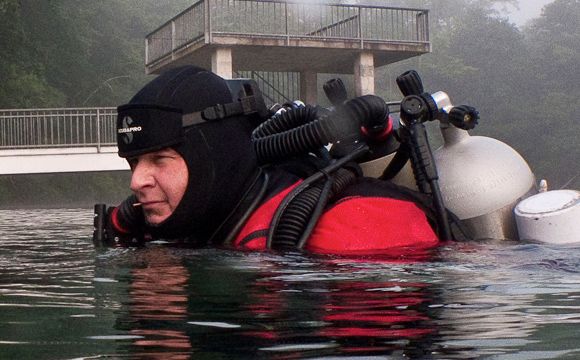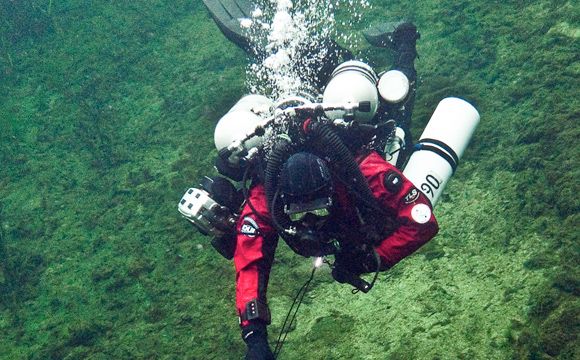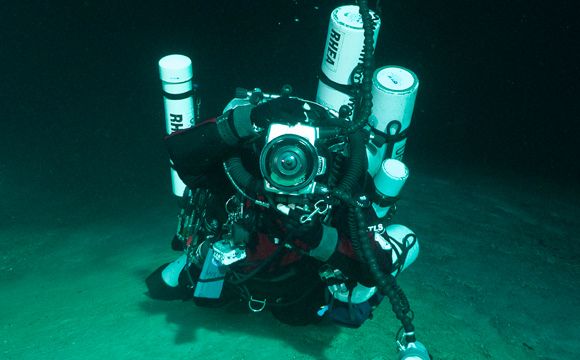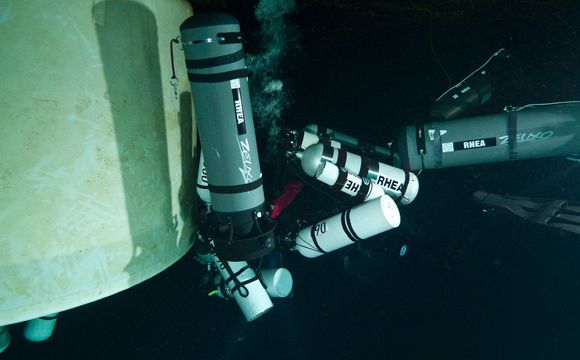
SCUBAPRO Deep Elite Team - David Rhea
David Rhea
Since he was a kid growing up in Tennessee David Rhea has been pushing the limits. But he never fully appreciated what that meant until he started diving. One of his very first dives was a sojourn into a cave, and he has been going deeper for longer in his underwater explorations ever since. When he's not exploring the mysteries of a dark underwater cave he can be found topside selling SCUBAPRO equipment. A lifelong SCUBAPRO fan, the store he opened 27 years ago is still a SCUBAPRO Platinum store, and after 35 years carrying a C-card, David is still a SCUBAPRO diver.

An Interview with David Rhea:
Give us some insight into your background.
"I was born and raised in Tennessee, and I've been diving since I was nine years old. Pretty much my whole life has revolved around the scuba business. I started teaching when I was 18, owned a number of dives stores, then in 1996 I came to work for SCUBAPRO. I've been a sales rep for the company ever since. While I've been living in Florida, I recently moved back to Tennessee where I live with my wife and two kids."
Tell us about the diving you like to do.
"Back when I first started diving, I traveled to the Florida Springs to do my open water check out. My instructor took me into a cave, which was a no-no, but actually it turned out to be a blessing for me, because that's when I became addicted to cave diving. I started cave diving a lot in the late '70s and early '80s, then became a cave diving instructor in 1985. To this day I am still very active teaching people how to cave dive through an organization called Global Under Water Explorers. We also do the mapping and surveying of caves all over the world. I've participated in cave mapping and surveying in China, Mexico, Australia and, of course, Florida. I'm also involved with a group called the Woodville Karst Plain Project. It's been around for 25 years mapping, surveying and studying the caves of Florida's Panhandle. Today we have over 20 miles of underground passages surveyed and mapped. We've completed dives that ranged from 20 to 30 hours under water at an average depth of 290 feet. However, most of the dives at that depth are now in a five to six hour range with 14 hours of decompression. We've done a lot of cutting-edge physiology with the empirical data we have collected during these dives. For example, our organization was the first to ever use trimix outside of a commercial or military application, and we kind of refined and perfected a lot of stuff that people in technical diving use today with mixed gasses. We currently have ongoing projects around the world; we just finished one in Australia and we have another in Mexico where they have already surveyed and explored over 100 miles of underground underwater passages, discovering everything from Mayan ruins to the remains of a mastodon elephant and the skulls of a caveman-this will be publicized in a future issue of National Geographic. So it's been very exciting and very personally rewarding to have been able to do this all my life."

Obviously, your kind of diving calls for special equipment. Tell us a little about that.
"The neat thing about exploration diving is that it's been integral to the development and improvement of a lot of diving equipment. For example, extending dive light burn times and diving propulsion vehicle ranges, and designing equipment to support the weight of all the gear that needs to be carried on these explorations, this has all been developed or improved by cave divers. In fact, my first position with SCUBAPRO back in 1995 was as a part-time technical advisor to help develop the X-Tech Line. Back then I owned a dive shop in Tennessee called Rhea's Diving. We were the very first shop in Tennessee to specialize in cave diving. SCUBAPRO was very interested in technical gear back then, so asked me to develop the X-Tech line. Unfortunately, at the time Europe was not as big into technical diving as America was, so we had to set it aside. But in recent years technical diving has come back globally, so the X-Tech line was resurrected. We've been continuously making improvements to the technical gear line ever since."
So tell us a little about SCUBAPRO regulators and why they are so special.
"When diving you need to be able to rely on your equipment. Divers know that when they put a SCUBAPRO regulator on their tank, they are going to have zero concerns about performance or reliability. This is even more important when diving in extreme environments where the depths get deeper and the gas gets denser. When you're experiencing lots of percolation from a wreck you're in, or parts of a ceiling are sprinkling down from a cave that you're in, it's nice to know that the one thing you don't have to worry about is your SCUBAPRO regulator. The MK25 is my favorite. I currently own in the neighborhood of 57 SCUBAPRO regulators scattered all over the world, and all of them are MK25s. Each one is teamed with either G250s, G250Vs, S600s or the new G260s. As someone who has used them my entire life, I can always say that when you're under water, in extreme conditions, you have a lot on your mind. It's nice that the one thing you don't have to worry about is your SCUBAPRO reg."

What do you think is so special about SCUBPRO computers?
"The nice thing for me as a diver is that I know I'm relying on a proven algorithm, one that's been in use for many years. There's been so much research devoted to our algorithm, especially the adaptive algorithm. With the adaptive algorithm I always like to say that anyone who is a really good diver, who can control ascent speeds and stay within the decompression or no-decompression requirements, is actually going to get more bottom time than a person with weaker skills. That's because the algorithm adapts to the diver rather than the other way around. I do the majority of my diving with my computer in gauge mode, but the thing I love most about gauge mode is that it has an average depth feature in it, so you always have your depth and your time, and if you're using a multitude of different gasses, or if you're doing extensive decompression, then you can figure that out ahead of time and use the average depth and be able to kind of tweak your own decompression based on your extreme exposures. My Galileo dive computer lets me do that, so does my Meridian. I like to wear both."
What about SCUBAPRO suits?
"The reason SCUBAPRO is so successful with its line of suits is the attention to detail. Instead of just coming out with a 'Me-Too' suit, we've stepped out of the box to find the finest neoprene that money can buy, then combined that with SCUBAPRO design and quality, and as a result, divers know they are getting the best."

So why SCUBAPRO for you?
"SCUBAPRO for me is an extension of my personality. What I mean by that is, ever since I was young I've been attracted to brand names that represent quality and attention to detail. When I first started diving I was fortunate to have an instructor who was a big SCUBAPRO fan. However, even though most divers tend to get branded based on their instructor's influences, I researched the brand and that reinforced my initial opinion. I am definitely a brand guy, I ride a Harley and will only ride a Harley, I drive a Ford and will only drive a Ford, so when I started owning my dive shops I was looking for a brand to carry that I could believe in, and I chose SCUBAPRO, and I've stuck with it ever since. It's never been about the price, it's always been about the quality, for over 35 years now, and still counting."




